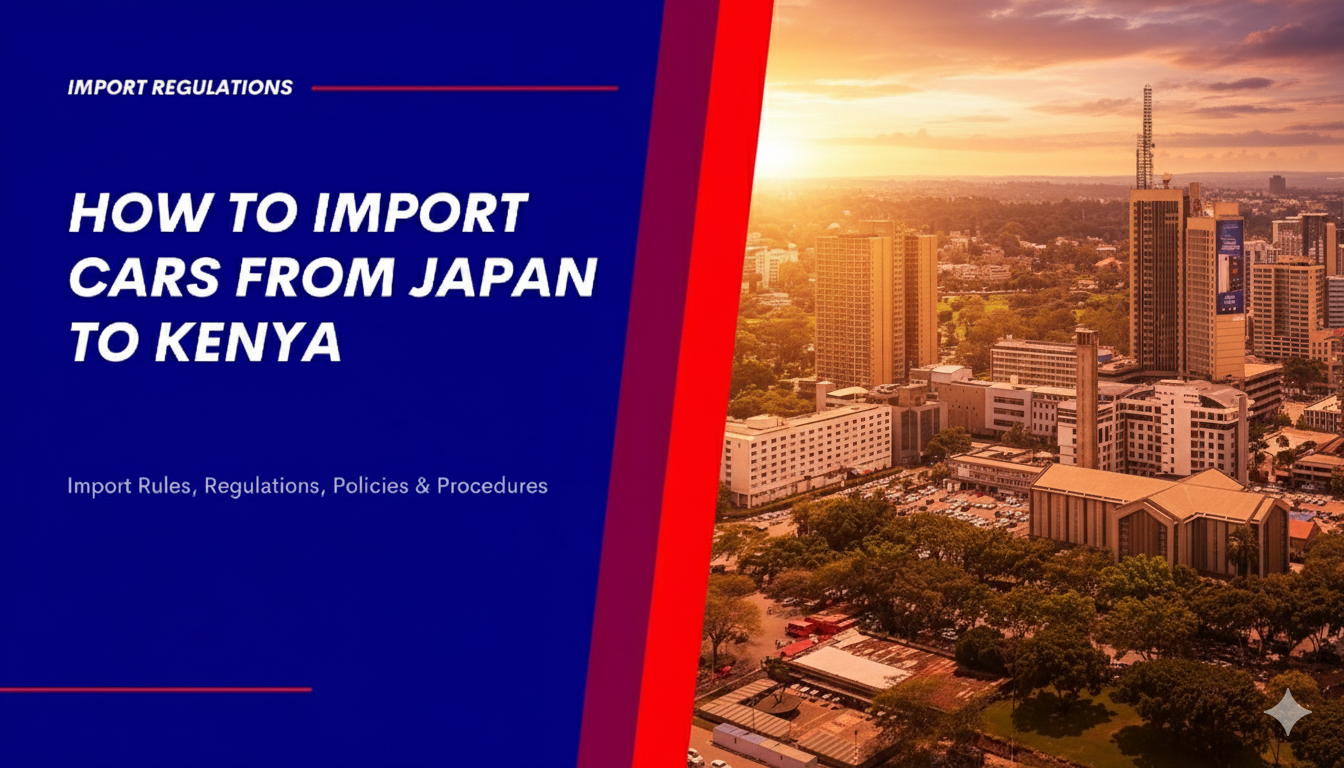
Importing cars from Japan to Kenya is a popular choice due to the affordability, reliability, and availability of high-quality used vehicles. However, the process requires compliance with Kenya’s import rules and regulations. This guide covers the procedures, duties, and key policies that prospective importers must follow to successfully bring a vehicle from Japan into Kenya.
Import Rules and Regulations
Age Limit
Kenya has strict rules regarding the age of imported vehicles. To reduce environmental pollution and ensure road safety, the maximum allowed age for vehicles is 8 years from the date of manufacture. Any vehicle older than this limit will not be allowed entry into Kenya. This applies to both private and commercial vehicles.
Vehicle Inspection
Before shipment, all vehicles being imported to Kenya must undergo inspection by the Japan Export Vehicle Inspection Center (JEVIC) or other approved organizations. This inspection ensures that the vehicle meets Kenyan standards for roadworthiness and safety. Key elements checked include:
- Structural integrity
- Emissions standards
- Odometer accuracy
The inspection certificate is mandatory, and vehicles without this certification will be denied entry at the port.
Import Duties and Taxes
Kenyan customs levy several taxes on imported vehicles. The primary ones include:
- Import Duty: 25% of the Customs Value.
- Excise Duty: Based on engine capacity, with 25% imposed on vehicles with an engine capacity of under 1500cc and 30% on those over 1500cc.
- Value Added Tax (VAT): 16% of the vehicle’s cost, including duty and excise taxes.
- Import Declaration Fee (IDF): 2% of the vehicle’s customs value.
- Railway Development Levy (RDL): 1.5% of the customs value.
These fees are calculated based on the customs value, which includes the cost, insurance, and freight (CIF) of the vehicle.
Roadworthiness Compliance
Once a vehicle has passed the required inspections and duties have been paid, it must comply with the Kenya Bureau of Standards (KEBS) specifications. This includes regulations on emissions and road safety. Imported cars should meet the Kenya Standard Code of Practice KS 1515:2000 for motor vehicles to be eligible for registration.
Procedures for Importing Cars
Step 1: Select and Purchase the Vehicle
Buyers typically select their vehicle from Japan-based exporters or auction sites. It’s crucial to verify the condition, age, and other relevant details of the car to ensure it meets Kenyan import regulations.
Step 2: Arrange Inspection
Before shipping, arrange for an inspection by JEVIC or an authorized body. The inspection certificate is essential to avoid delays or penalties during the import process.
Step 3: Shipping and Documentation
Once the vehicle has passed inspection, arrange for shipping to Kenya. Common ports of arrival include Mombasa. Ensure that all documentation, including the following, is in order:
- Bill of Lading (BOL)
- Import Declaration Form (IDF)
- Pre-Export Verification of Conformity (PVoC) certificate
- Commercial invoice
Step 4: Customs Clearance and Payment of Duties
Upon arrival at the port, you must present all documentation for customs clearance. The vehicle will then be subjected to the payment of the required import duties and taxes.
Step 5: Vehicle Registration
After clearing customs, the vehicle must be registered with the National Transport and Safety Authority (NTSA) in Kenya. The NTSA will issue a number plate and logbook once all requirements are fulfilled.
Policies on Emissions and Road Safety
Kenya is becoming more stringent on emissions and safety standards to ensure that only environmentally friendly and safe vehicles are allowed into the country. Vehicles imported from Japan must meet these standards, which include:
- Compliance with international emission standards (e.g., Euro IV or equivalent).
- Roadworthiness, with special attention to brakes, lights, and tires.
Failure to comply with these standards can result in the vehicle being rejected or fined upon entry.
Commonly Imported Vehicles
Japanese vehicles are popular in Kenya for their reliability, fuel efficiency, and affordable spare parts. Commonly imported models include:
- Toyota (especially the Toyota Vitz, Prado, and Land Cruiser)
- Nissan (Nissan X-Trail, Nissan Note)
- Honda (Honda Fit, Honda CR-V)
- Subaru (Subaru Forester, Subaru Outback)
These brands dominate the Kenyan market due to their durability and suitability for both urban and rural driving conditions.
Conclusion
Importing a car from Japan to Kenya is a straightforward process as long as you adhere to the established rules and regulations. By ensuring that your vehicle meets the age limit, passes inspection, and complies with Kenya’s roadworthiness and emission standards, you can enjoy the benefits of a quality Japanese car at an affordable price. Proper planning and attention to detail in terms of documentation and duties will help avoid delays and additional costs.

